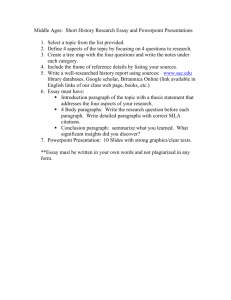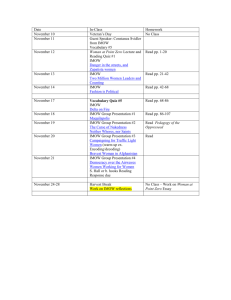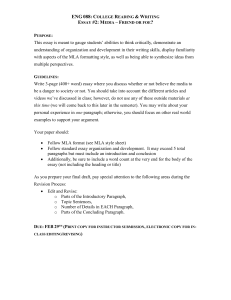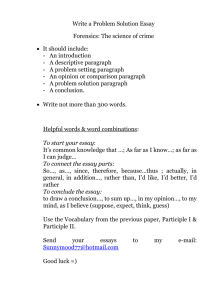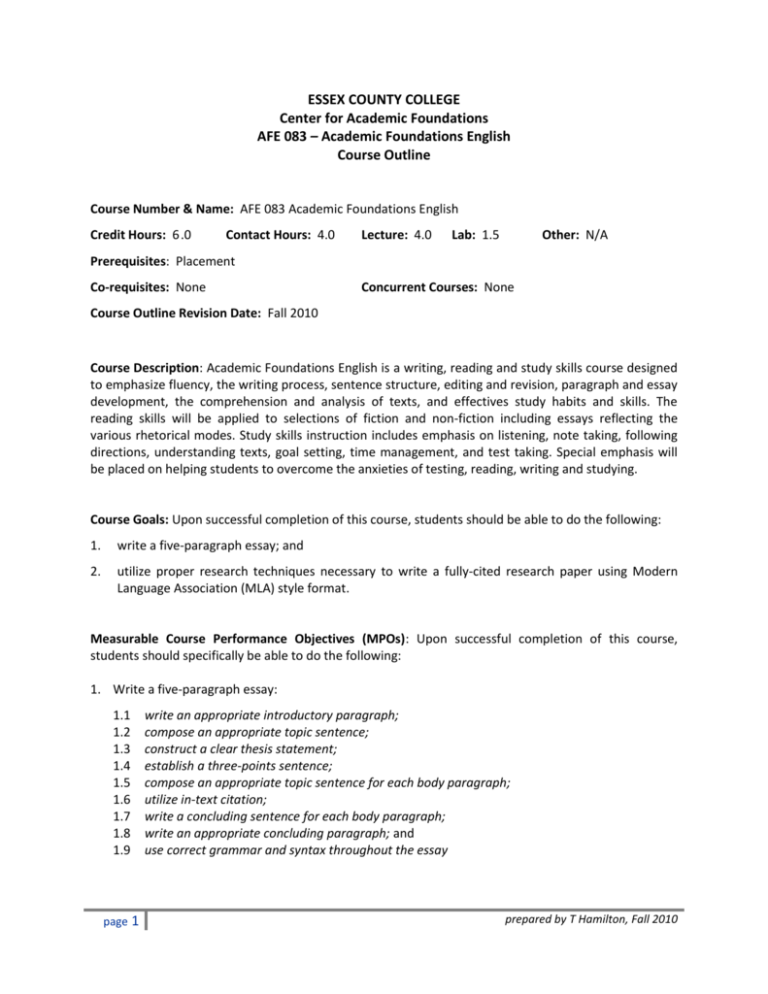
ESSEX COUNTY COLLEGE
Center for Academic Foundations
AFE 083 – Academic Foundations English
Course Outline
Course Number & Name: AFE 083 Academic Foundations English
Credit Hours: 6 .0
Contact Hours: 4.0
Lecture: 4.0
Lab: 1.5
Other: N/A
Prerequisites: Placement
Co-requisites: None
Concurrent Courses: None
Course Outline Revision Date: Fall 2010
Course Description: Academic Foundations English is a writing, reading and study skills course designed
to emphasize fluency, the writing process, sentence structure, editing and revision, paragraph and essay
development, the comprehension and analysis of texts, and effectives study habits and skills. The
reading skills will be applied to selections of fiction and non-fiction including essays reflecting the
various rhetorical modes. Study skills instruction includes emphasis on listening, note taking, following
directions, understanding texts, goal setting, time management, and test taking. Special emphasis will
be placed on helping students to overcome the anxieties of testing, reading, writing and studying.
Course Goals: Upon successful completion of this course, students should be able to do the following:
1.
write a five-paragraph essay; and
2.
utilize proper research techniques necessary to write a fully-cited research paper using Modern
Language Association (MLA) style format.
Measurable Course Performance Objectives (MPOs): Upon successful completion of this course,
students should specifically be able to do the following:
1. Write a five-paragraph essay:
1.1
1.2
1.3
1.4
1.5
1.6
1.7
1.8
1.9
page 1
write an appropriate introductory paragraph;
compose an appropriate topic sentence;
construct a clear thesis statement;
establish a three-points sentence;
compose an appropriate topic sentence for each body paragraph;
utilize in-text citation;
write a concluding sentence for each body paragraph;
write an appropriate concluding paragraph; and
use correct grammar and syntax throughout the essay
prepared by T Hamilton, Fall 2010
2. Utilize proper research techniques necessary to write a fully-cited research paper using Modern
Language Association (MLA) style format:
2.1
2.2
2.3
use correct MLA format;
properly cite various sources within the research paper; and
correctly format the research paper
Methods of Instruction: Instruction will consist of a combination of lectures, in-class assignments, class
discussions, group work, computer lab work (web-based learning), and homework.
Outcomes Assessment: Checklist rubrics are used to evaluate sampled student essays from the
midterm and final exams. Data is analyzed and the results of this analysis are used to guide necessary
pedagogical and/or curricular revisions.
Course Requirements: All students are required to:
1. Maintain regular attendance.
2. Be punctual to every class session including lab and tutorial sessions.
3. Complete assigned homework.
4. Word process take-home essay assignments using MLA format. The essays should be double-spaced
using Times New Roman font.
Methods of Evaluation: Final course grades will be computed as follows:
Grading Components
Homework, 10 or more chapter quizzes and class participation
% of
final course grade
20%
Homework, quizzes, and class participation will provide
evidence of the extent to which students meet course
objectives including, but not limited to, choosing appropriate
subjects, developing topics, and writing, editing and revising
well-formed essays.
Tutoring
10%
Tutoring is a required component for all AFE 083 students. A
one-hour mandatory tutoring session is held after each class.
My Skills Lab (web-based learning)
10%
Students are required to work on My Skills Lab during the
appointed class session and are expected to complete any
unfinished work at home as necessary. NOTE: In order to receive
the 10% credit, students must complete at least 80% of the My
Skills Lab assignments.
page 2
prepared by T Hamilton, Fall 2010
Methods of Evaluation (continued):
Grading Components
% of
final course grade
Divisional Midterm Exam
20%
The Midterm Exam, which is based on an assigned reading
provided by the ECC English Department, will provide evidence
of the extent to which students meet course objectives
including developing a well-written essay.
Research Paper
10%
The required mini research paper (3 – 5 pages) will show
evidence of the extent to which students meet course
objectives including developing a topic, an introduction, and a
thesis, developing paragraph and essay structure, providing a
conclusion, and citing sources using proper MLA format.
Departmental Final Exam
30%
The same objectives apply as with the midterm exam. The
departmental final exam will examine the extent to which
students have understood and synthesized the course material.
NOTE: Students must pass the Departmental Final Exam in order to pass the course.
Academic Integrity: Dishonesty disrupts the search for truth that is inherent in the learning process and
so devalues the purpose and the mission of the College. Academic dishonesty includes, but is not
limited to, the following:
plagiarism – the failure to acknowledge another writer’s words or ideas or to give proper credit
to sources of information;
cheating – knowingly obtaining or giving unauthorized information on any test/exam or any
other academic assignment;
interference – any interruption of the academic process that prevents others from the proper
engagement in learning or teaching; and
fraud – any act or instance of willful deceit or trickery.
Violations of academic integrity will be dealt with by imposing appropriate sanctions. Sanctions for acts
of academic dishonesty could include the resubmission of an assignment, failure of the test/exam,
failure in the course, probation, suspension from the College, and even expulsion from the College.
Student Code of Conduct: All students are expected to conduct themselves as responsible and
considerate adults who respect the rights of others. Disruptive behavior will not be tolerated. All
students are also expected to attend and be on time all class meetings. No cell phones or similar
electronic devices are permitted in class. Please refer to the Essex County College student handbook,
Lifeline, for more specific information about the College’s Code of Conduct and attendance
requirements.
page 3
prepared by T Hamilton, Fall 2010
Course Content Outline: based on the following texts:
Biays, John Sheridan and Carol Wershoven. Along These Lines: Writing Sentences and Paragraphs. 3rd ed.
Upper Saddle River, NJ: Pearson/Prentice Hall, 2007.
Minor, Dorothy, ed. Patterns. Upper Saddle River, NJ: Pearson/Prentice Hall, 2005.
Required Course Materials:
Flash drive/memory stick for saving all class assignments
A working e-mail address
A folder for saving all completed assignments
NOTE: In-class quizzes or journal assignments will be given in addition to the writing assignments listed
below. All reading should be studied before each class for which they are assigned.
Week
Topics to be Covered
1
Initial Writing Sample
Introduction to the Course
Review of Class Syllabus
Topic Development Exercise
Introduction to the Five-paragraph Essay
2
Writing a Paragraph: Sentence-level Skills
Along These Lines, pp 1 – 22
Chapter Quiz #1
Cisneros, Sandra, “Only Daughter” (Narration)
Patterns, pp 1 – 4
In-class Writing
3
Beyond the Simple Sentence: Coordination
Along These Lines, pp 24 – 42
Chapter Quiz #2
Vonnegut, Kurt, “How to Write with Style”
Patterns, pp 49 – 52
Out-of-class Writing
4
Avoiding Run-on Sentences and Comma Splices
Along These Lines, pp 44 – 51
Writing a Paragraph: Drafting – Writing and Revising the Draft
Along These Lines, pp 312 – 318
Chapter Quiz #3
Tannen, Deborah, “Sex, Lies, and Conversation” (Comparison and Contrast)
Patterns, pp 125 – 127
In-class Writing
page 4
prepared by T Hamilton, Fall 2010
Week
Topics to be Covered
5
Beyond the Simple Sentence: Subordination
Along These Lines, pp 53 – 62
Moving From Paragraphs to Essays
Along These Lines, pp 427 – 442
Chapter Quiz #4
Momaday, Scott N, “The Way to Rainy Mountain” (Description)
Patterns, pp 30 – 35
Out-of-class Writing
6
Avoiding Sentence Fragments
Along These Lines, pp 71 – 82
Moving From Paragraph to Essays
Along These Lines, pp 442 – 458
Chapter Quiz #5
Staples, Brent, “Just Walk on By” (Exemplification)
Patterns, pp130 – 142
In-class Writing
7
Review for Midterm Exam
Review of grammar rules, guided by errors most often made by students in writing
8
Midterm Exam
Review of Midterm Exam
Writing a Paragraph: Polishing – Polishing and Proofreading
Along These Lines, pp 319 – 328
9
Using Adjectives and Adverbs
Along These Lines, pp 93 – 104
Correcting Problems with Modifiers
Along These Lines, pp 106 – 115
Writing a Narrative Paragraph
Along These Lines, pp 329 – 360
Chapter Quiz #6
First Draft of the Research Paper is due (No Exceptions)
Orwell, George, “Shooting an Elephant”
Patterns, pp 10 – 16
In-class Writing
10
Verbs: The Four Main Forms
Along These Lines, pp 117 – 138
More on Verb Tenses
Along These Lines, pp 140 – 151
Chapter Quiz #7
Zinsser, William, “College Pressure” (Classification/Division)
Patterns, pp 117 – 124
Out-of-class Writing
page 5
prepared by T Hamilton, Fall 2010
Week
Topics to be Covered
11
Verbs: Consistency and Voice
Along These Lines, pp 152 – 161
Making Subject and Verbs Agree
Along These Lines, pp 163 – 180
Chapter Quiz #8
Brady, Judy, “Why I Want a Wife”
Patterns, pp 125 – 127
Out- of-class Writing
12
Using Pronouns Correctly: Agreement and Reference
Along These Lines, pp 181 – 187
Using Pronouns Correctly: Consistency and Case
Along These Lines, pp 197 – 207
Chapter Quiz #9
Rodriguez, Richard, “The Fare of Losing a Culture” (Cause and Effect)
In-class Writing
13
Punctuation
Along These Lines, pp 208 – 237
Research Paper is due
King, Robert D, “Should English Be the Law? (Persuasive Argumentation)
Chapter Quiz #10
Patterns, pp 69 – 81
In-class Writing
14
Preparation for Final Exam
15
Final Exam
Review of Course
page 6
prepared by T Hamilton, Fall 2010


